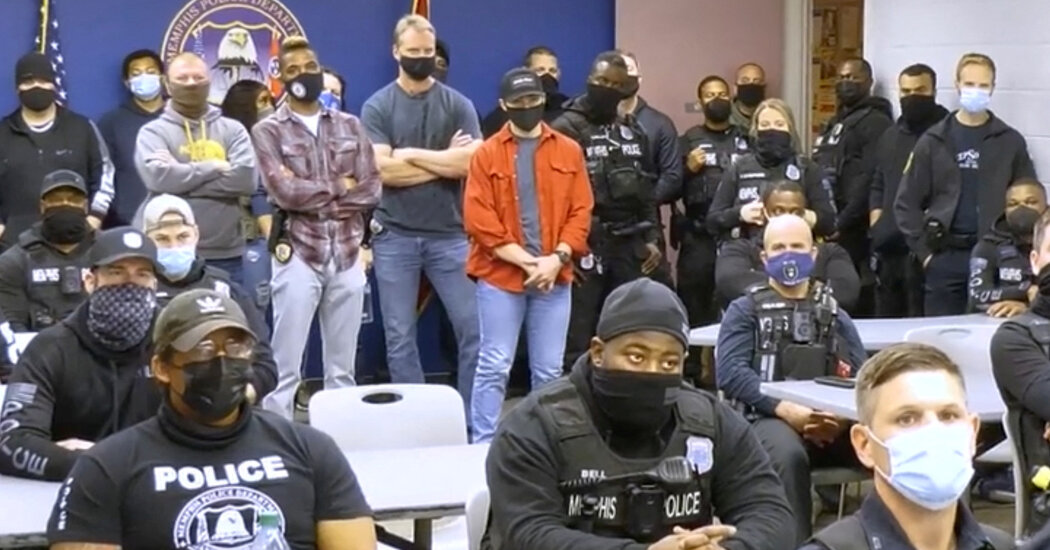The Debate Over Covid’s Origin
Both U.S. political parties are now open to the idea that Covid may have come from a lab in China.A new House committee investigating the origins of Covid opened its first public hearing yesterday with plenty of political theater. Republicans accused Dr. Anthony Fauci of covering up the virus’s origins, and Democrats criticized those claims as biased and unsubstantiated. But lawmakers displayed bipartisan agreement on one point: The virus really may have come from a laboratory in China.“Whether it was a lab leak or infection through animals, I think we’ve got to pursue both of those paths if we are ever to get the truth,” Representative Kweisi Mfume, Democrat of Maryland, said.Such agreement might have been surprising not long ago. From the start of the pandemic, the idea of a lab leak was fraught. Some scientists treated it as an outright conspiracy theory. Many Democratic politicians, journalists and others instead embraced the explanation that the virus jumped from animals to humans.Now, the F.B.I. and the Energy Department, which employ leading U.S. scientists, say a lab is the likely origin. But they remain uncertain, and four other U.S. intelligence agencies say, with low confidence, that it more likely originated in animals.Today’s newsletter will explain the debate over the theory and why it matters.What’s the lab leak theory?There are actually multiple lab leak theories.The most plausible is that the virus accidentally leaked from a lab in Wuhan, China, where scientists may have been studying it, and possibly engineered it, for research and medical purposes.That theory differs from the claim that lab scientists created Covid as a bioweapon or that China intentionally leaked the virus. Neither experts nor U.S. officials take that assertion seriously. “It is an important distinction,” said my colleague Sheryl Gay Stolberg, who covers health policy.What is the case for each explanation?The natural origin theory: Animal-to-human transmission is the predominant origin of viral diseases, including other coronaviruses and bird flus. Many of the first confirmed Covid cases were linked to an animal market in Wuhan, and live mammals there are known to spread viruses.The lab leak theory: Wuhan is home to an advanced virus-research lab and the Chinese C.D.C. — ties that lend credence to the idea of a lab leak, much as the animal market’s presence does for the natural origin theory. Chinese officials’ apparent destruction of evidence adds to the suspicions of a lab leak. Biological labs around the world also have a history of accidental leaks.Even many officials and others who lean toward one of the two theories remain uncertain. U.S. officials are divided and acknowledge they are working with imperfect information, largely because China has not allowed an independent investigation within its borders.Why does this debate matter?For many, determining the cause of a pandemic that has killed nearly seven million people worldwide, including 1.1 million in the U.S., is important regardless of broader implications. Basically, the truth matters for its own sake.The Wuhan Institute of Virology.Hector Retamal/Agence France-Presse — Getty ImagesLearning the origins of Covid could help save lives, too. If the virus came from an animal, then studying and tracking the spread of viruses in nature could be crucial to preventing the next pandemic. If it originated in a lab, then improving the security and safety of virology labs might be more important.And if both theories seem plausible, that is a case for doing more to prevent animal-to-human transmission and future lab leaks. “Some scientists argue there’s more to be done on both fronts,” said my colleague Benjamin Mueller, who covers health and science.Why the lab leak skepticism?Some scientists who initially dismissed the lab leak based their views on earlier, incomplete evidence. At first, experts embraced the animal market explanation because some of the first confirmed cases, from December 2019, were linked to the market. But researchers later discovered that the virus may have been spreading weeks earlier, and it is not clear that those cases were linked to the market.Typical human bias probably played a role in the skepticism, too. “Scientists are human, and science has become a vested-interest industry,” Tim Trevan, founder of the safety consulting company Chrome Biorisk Management, wrote in The Wall Street Journal.Early in the pandemic, the lab leak theory became politicized when Donald Trump and his allies began promoting it. Many experts took sides, as did much of the public. Some may have also feared that blaming scientists for Covid could have vilified their industry and hurt the funding they rely on. The dynamic is a reminder that experts are also susceptible to biases and self-interest like the rest of us.Will we ever know the origin?Probably not. Pinning down the origin of a virus is inherently difficult. China has made the task harder, blocking outside investigations and refusing to share data on the virus’s spread.But the investigations, including the House’s, have already spurred discussion and debate about better tracking of animal viruses and improving lab security. Those steps could help save lives even if we never know what really caused the Covid pandemic.For more: “Assigning blame is not going to bring back seven million people” The hearing showed the difficulty of uncovering conclusive evidence about Covid’s origin.THE LATEST NEWSPoliticsMitch McConnell, the Senate minority leader, was hospitalized after tripping at a Washington hotel.“I hate him passionately”: Tucker Carlson’s texts show contempt for Trump. Read the messages.Senator Mark Warner, a Democrat, criticized the Biden administration for refusing to show Congress classified documents found at the homes of Biden, Trump and Mike Pence.A former New York City Hall insider has found lucrative work with real estate companies, worrying critics about his influence on Mayor Eric Adams.An Arizona county gave a Republican election skeptic the power to oversee voting. The state’s Democratic attorney general is suing.More Black women are running for office, confronting racism and sexism. A Black woman has never been a governor, and only two have been senators.InternationalAn armed guard in Dhangri village.Atul Loke for The New York TimesIndia is arming villagers in part of Kashmir, one of the world’s most militarized places, after attacks against Hindus.Russia launched missiles at residential areas in Ukraine this morning, killing at least nine people.After street protests, Georgian lawmakers dropped a law that critics said was inspired by Russia and would have been used to clamp down on dissent.Recent kidnappings in Mexico have brought attention to the medical tourism industry.Other Big StoriesA memorial to Breonna Taylor, whom the police shot to death in 2020.Xavier Burrell for The New York TimesThe police in Louisville, Ky., disproportionately pulled over Black drivers and used racist epithets as part of a pattern of discrimination, the Justice Department found.California is bracing for more heavy rain and snow.Scientists announced a breakthrough in superconductors, which could someday transform the way electrical devices work.The murder conviction for the lawyer Alex Murdaugh unraveled his family’s century of influence in South Carolina.The director of the Whitney Museum in New York will step down after 20 years. OpinionsEnglish majors are disappearing, partly because of the miserable way K-12 schools teach it, Pamela Paul writes.The Supreme Court isn’t just scrutinizing Biden’s student debt program. It’s also confronting the ways presidents have abused emergency powers since Sept. 11, says Christopher Caldwell.Jennifer Finney Boylan was a Rockefeller Republican at the start of Jimmy Carter’s presidency. His triumphs — and failures — turned her into a progressive, she writes.MORNING READSKate DehlerCluttercore: Your bedroom isn’t messy — it’s trendy.High-altitude treks: Nepal will ban solo hikers in its national parks.Restaurant review: Soupless ramen in a stressless setting.A morning listen: Imagining life with the men of their dreams.Advice from Wirecutter: How to clean your Birkenstocks.Lives Lived: Topol, an Israeli actor, took on the role of Tevye in “Fiddler on the Roof” in his late 20s and reprised the role for decades. He died at 87.SPORTS NEWS FROM THE ATHLETICJim BoeheimChris Carlson/Associated PressA titan: Syracuse basketball coach Jim Boeheim said he would retire after 47 seasons coaching the Orange. He leaves with the second-most wins in N.C.A.A. history.NDA challenge: Erica Herman, Tiger Woods’s former girlfriend, asked a court to release her from a nondisclosure agreement that she says Woods made her sign in 2017.Staying a Yankee: The story of how Aaron Judge turned down more than $40 million extra from the San Diego Padres.ARTS AND IDEAS To glove or not to glove?Chris Ratcliffe/Getty ImagesThe cotton menacePicture a museum worker holding up a centuries-old book. Is the person wearing white gloves? “The glove thing,” one museum director said, wearily, to The Times’s Jennifer Schuessler. “It just won’t die.”People who work with rare books say the conventional wisdom is wrong: Delicate manuscripts should not be handled with gloves — which make fingers clumsy and actually attract dirt — but with clean, bare hands. Barbara Heritage, a curator at the University of Virginia, acknowledged it could be “shocking” to see precious books handled with bare hands. “But that’s how these books were read, and how they were made,” she said.PLAY, WATCH, EATWhat to CookLinda Xiao for The New York TimesSteam, roast or pan-grill this salmon in aluminum foil.What to ReadPatricia Highsmith was excellent at creating psychopathic antiheroes. Browse a guide to her best books.The OscarsWatch scenes from eight of the Best Picture nominees, narrated by their directors.Late NightThe hosts can’t believe Tucker Carlson’s texts about Trump.Now Time to PlayThe pangram from yesterday’s Spelling Bee was embankment. Here is today’s puzzle.Here’s today’s Mini Crossword, and a clue: Let the spirit move you? (three letters).And here’s today’s Wordle. Thanks for spending part of your morning with The Times. See you tomorrow.P.S. “A pro in every aspect of crossword making”: Lynn Lempel published her 100th puzzle in The Times this week.Here’s today’s front page.“The Daily” is about migrant children.Matthew Cullen, Lauren Hard, Lauren Jackson, Claire Moses, Ian Prasad Philbrick, Tom Wright-Piersanti and Ashley Wu contributed to The Morning. You can reach the team at [email protected] up here to get this newsletter in your inbox.


